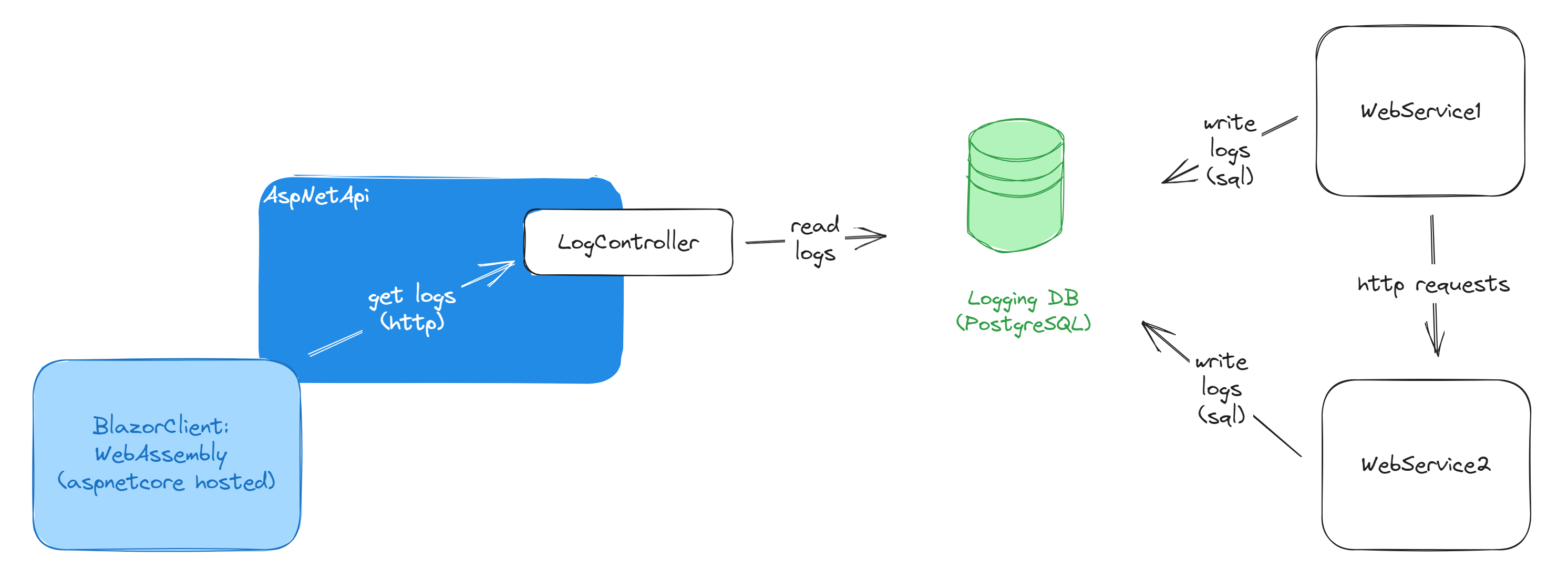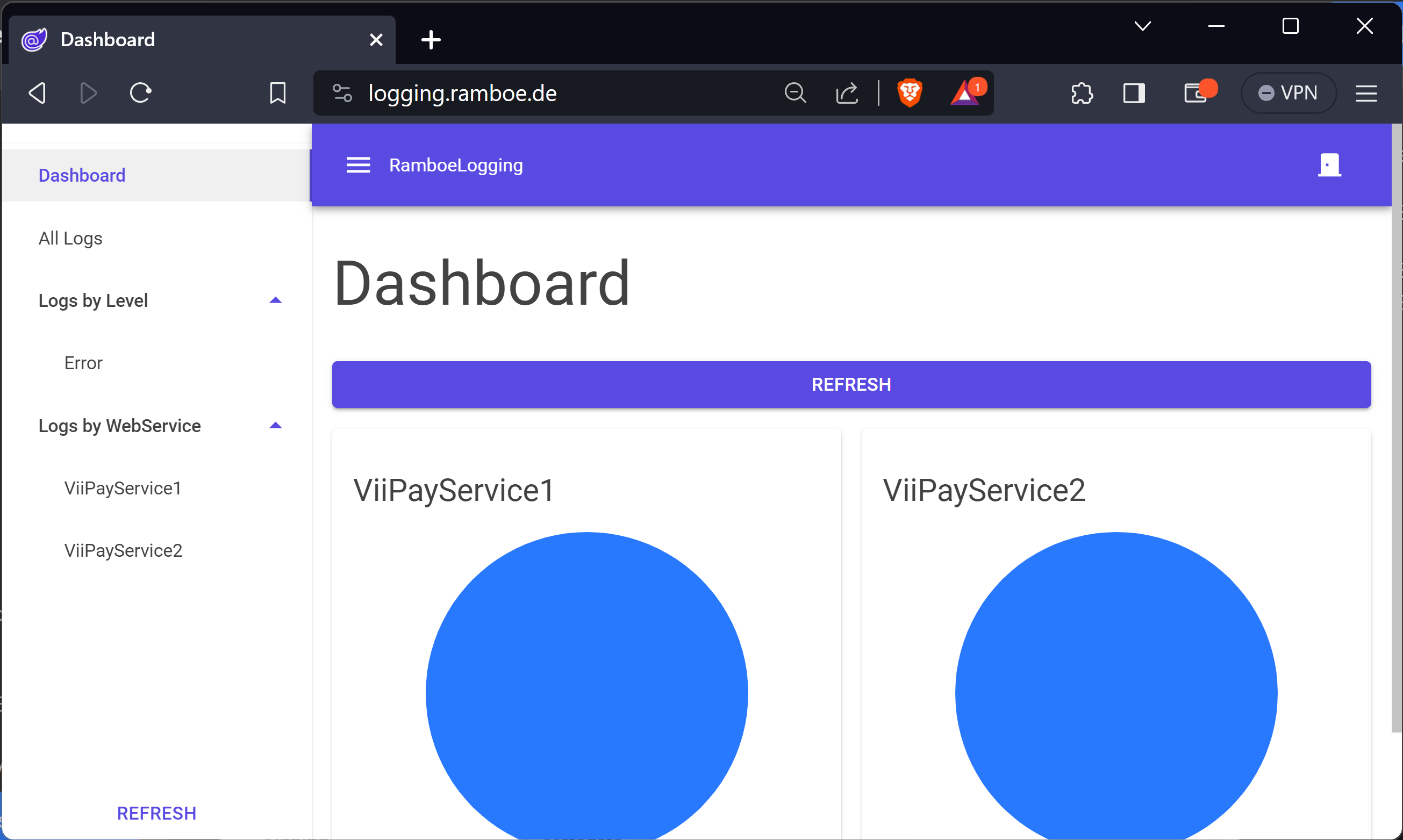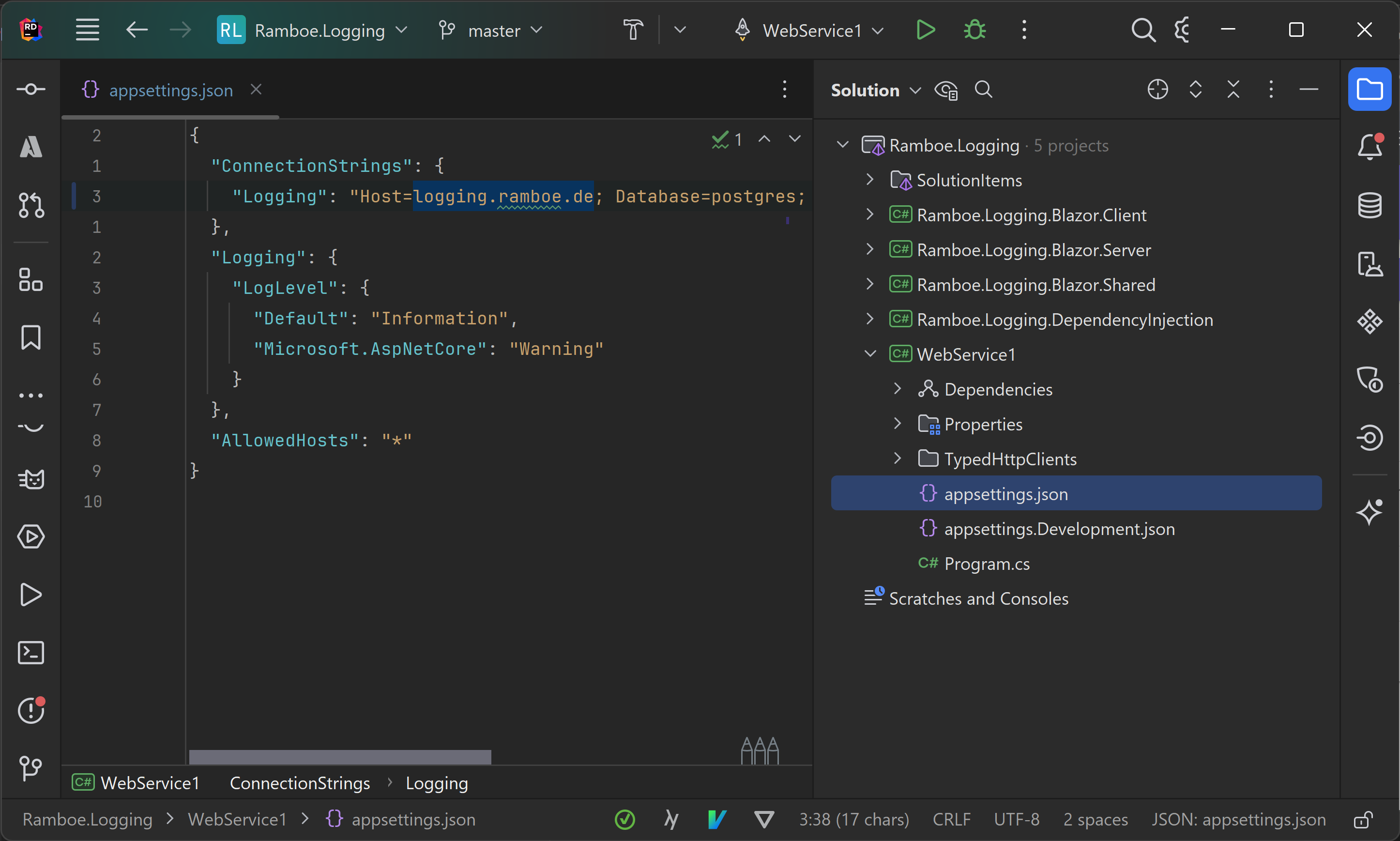| .idea/config | ||
| Ramboe.Logging | ||
| Ramboe.Logging.Blazor | ||
| Ramboe.Logging.DependencyInjection | ||
| Ramboe.Logging.Server | ||
| SolutionItems/Deployment | ||
| WebService1 | ||
| .gitignore | ||
| Ramboe.Logging.sln | ||
| README.md | ||
Description
Ramboe.Logging is an ecosystem which consists of a postgresql database container (to write logs into) and an aspnet core hosted blazor webassembly to display the logs from postgresql.
Check out the Ramboe.Logging.DependencyInjection nuget package, so you can actually write some logs from your aspnet core webservices
Deploy the Ramboe.Logging ecosystem to your environment
Prerequisites
linux machine with docker + docker-compose installed
On your linux machine
create directory /mnt/compose
mkdir /mnt/compose/
copy '.env' + 'docker-compose' from this github repository's deployment folder into /mnt/compose (or create the files and copy the following code into)
docker-compose.yml
# This docker-compose file will deploy the ramboe.logging ecosystem which consists of a postgresql database container (to write logs into) and an aspnet core hosted blazor webassembly to display the logs from postgresql.
# When executing the docker-compose file, make sure to supply a '.env' file (that contains values for POSTGRES_USER and POSTGRES_PASSWORD) in the same directory
# In addition the ramboe.logging ecosystem, this docker-compose file also deploys a traefik instance for automatic SSL certificate creation and routing. Look for the 'adjust' marker to know where to put your own data in.
version: "3.3"
services:
# Reverse Proxy + SSL cert generation
traefik:
image: "traefik:v2.10"
container_name: "traefik"
command:
# foundation [don't touch]
- "--api.insecure=true"
- "--providers.docker=true"
- "--providers.docker.exposedbydefault=false"
- "--entrypoints.web.address=:80"
- "--entrypoints.websecure.address=:443"
- "--certificatesresolvers.myresolver.acme.tlschallenge=true"
- "--certificatesresolvers.myresolver.acme.storage=/letsencrypt/acme.json"
# the email connected to your domain
- "--certificatesresolvers.myresolver.acme.email=your.mail@here.com" adjust
# ports [don't touch]
ports:
- "443:443"
- "80:80"
# volumes [don't touch]
volumes:
- "./letsencrypt:/letsencrypt"
- "/var/run/docker.sock:/var/run/docker.sock:ro"
labels:
# Dashboard
- "traefik.enable=true"
- "traefik.http.routers.traefik.rule=Host(`traefik.logging.ramboe.de`)" adjust
- "traefik.http.routers.traefik.entrypoints=websecure"
- "traefik.http.routers.traefik.tls.certresolver=myresolver"
# global redirect to https [don't touch]
- "traefik.http.routers.http-catchall.rule=hostregexp(`{host:.+}`)"
- "traefik.http.routers.http-catchall.entrypoints=web"
- "traefik.http.routers.http-catchall.middlewares=redirect-to-https"
# middleware redirect [don't touch]
- "traefik.http.middlewares.redirect-to-https.redirectscheme.scheme=https"
# Blazor Server, hosting WASM, talking to Logging db
blazor-server-with-wasm:
image: "ramboe/ramboe-logging-blazor-server:1.0.0" adjust (if you want to use your own image)
container_name: "blazor-server-with-wasm"
depends_on:
- logging-db
ports:
- "80"
environment:
- ASPNETCORE_ENVIRONMENT=Production
- "ConnectionStrings:Logging=Host=logging-db; Port=5432; Database=postgres; Username=${POSTGRES_USER}; Password=${POSTGRES_PASSWORD}"
labels:
- "traefik.enable=true"
- "traefik.http.routers.blazor-server-with-wasm.rule=Host(`logging.ramboe.de`)" adjust - Change the host url here
- "traefik.http.routers.blazor-server-with-wasm.entrypoints=websecure"
- "traefik.http.routers.blazor-server-with-wasm.tls.certresolver=myresolver"
# postgres sql container
logging-db:
container_name: "logging-db"
image: postgres:14.1-alpine
restart: always
environment: adjust
- POSTGRES_USER=${POSTGRES_USER:-postgres}
- POSTGRES_PASSWORD=${POSTGRES_PASSWORD:-password}
ports:
- '5432:5432'
volumes:
- db:/var/lib/postgresql/data
volumes:
db:
driver: local
.env
POSTGRES_USER=postgres
POSTGRES_PASSWORD=mypassword
then
docker-compose up -d
Accessing RamboeLogs
you can now use the url to this machine (which is set with the docker-compose file, if traefik is used) to access the blazor frontend and also for the connection string to the postgresqldb
Write ramboe logs from your application
Check out the Ramboe.Logging.DependencyInjection nuget package, so you can actually write some logs from your aspnet core webservices


